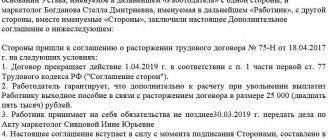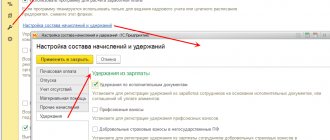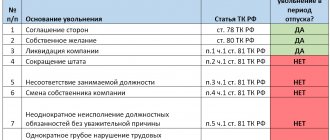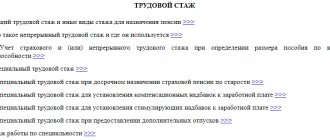How is the process of terminating an employment contract carried out?
According to the norms of the Labor Code of the Russian Federation, in particular, Art. 80 of the Labor Code of the Russian Federation, the procedure is implemented as follows:
- the employee submits an application;
- the boss gets acquainted with the document;
- further, the manager issues an order;
- the employee is credited with the funds due;
- The employee is given money and documents.
But in the case under consideration, there is one very significant nuance: the employee and the boss are at a certain distance.
They cannot meet, exchange documents, and the employee cannot immediately receive cash earned. With all this, it is possible to resign from a distance, according to current legislation. Be aware of this!
How to resign while in another city, is it possible by phone?
Labor legislation allows citizens to dismiss themselves at will without visiting their place of work. Article 80 of the Labor Code of the Russian Federation regulates the termination of a contract at the will of the employee, including remotely. The procedure starts after informing the management of the enterprise about your decision within the period specified by law.
Mostly this working period is 14 days, but in some cases it can be shortened or increased.
It turns out that if an employee remotely notifies the employer of his resignation, he is still obliged to come to the enterprise and work for the specified period.
The duration of the notification period depends on the circumstances and is determined by the Labor Code of the Russian Federation:
- 2 weeks is the standard period (Article 80 of the Labor Code of the Russian Federation).
- 3 days - when staying on a probationary period (Article 71 of the Labor Code).
- 3 days - for seasonal employment (Article 296 of the Labor Code).
- 3 days - when drawing up an agreement for a period of up to 2 months (Article 292 of the Labor Code).
- 1 month - for the head of the organization (Article 280 of the Labor Code).
- 1 month - for coaches, athletes with a contract valid for more than 4 months. In this case, it is possible to increase the period (Article 348.12).
You can resign without working off by agreement with the employer or for good reasons specified in Art. 80 Labor Code of the Russian Federation:
- upon admission to an educational institution;
- upon retirement;
- when the management of the organization violates legal norms.
There may be other cases that allow leaving without work, when work activity becomes impossible - when:
- moving;
- conscription into the army;
- receiving disability;
- development of occupational pathologies and so on.
A citizen who is on vacation or sick leave has the right to resign without visiting the employer and working off work, since this period is counted towards the designated notification period.
If an employee works remotely, the standard legislation also applies to him; additional conditions may be provided for in the employment agreement. Dismissal at the request of the employee is possible on the basis of a statement informing the manager about the decision made within the period specified by law.
Features of labor regulation for remote workers are presented in Chapter. 49.1 Labor Code of the Russian Federation.
Often a person decides to quit without visiting the employer due to life circumstances or the remote nature of work. Common reasons include conflicts with management, relocation, and illness. If work is not required, the parties only have to exchange the documentation necessary to carry out the procedure.
Informing the employer upon remote termination of the contract is carried out:
- through an intermediary acting under a power of attorney;
- by regular mail;
- by email.
The law stipulates that written notification to management is mandatory, so verbal warnings (for example, by telephone) are unacceptable. In the event of further disputes, only a written statement will help protect the employee’s rights.
Information provided through instant messengers, SMS and other similar services is also not official, since it is not possible to reliably confirm the identity of the applicant.
Remote dismissal is recommended to be used under compelling circumstances due to its disadvantages:
- The risk of illegal dismissal - if the application is submitted not by the employee, but by a third party. In this case, a trial and a graphological examination are carried out. If the termination of the contract is declared illegal, the employee is reinstated in his position with compensation for forced absence.
- Dependence on mail operation - risk of delays, loss of letters.
- Duration of the procedure - the reporting period begins on the day following the date of receipt of the notification by the employer.
However, remote termination of the contract is convenient because it allows you to avoid time spent visiting the organization and not having to contact management in case of conflicts.
How to draw up and submit an application
This is the most important question in the topic.
If the application for voluntary resignation is submitted incorrectly, the entire procedure may be delayed. Or leaving work may not happen at all. About the form of the document: everything is standard here. There is no model developed by any government agency. But the practice has developed in such a way that the document states:
- employee and employer data;
- a request to terminate the contract at the initiative of the employee submitting the application;
- the number with which the employee wishes to leave his position;
- date of application.
The employee puts his signature under the text of the document.
Additionally: an employee, if he also wants to receive a work book remotely, must express his consent to sending documents in this way. Otherwise, the employer will not be able to send the papers.
You just need to write: “Please send your work book and all necessary documents by mail to the address...”.
But what is much more important is how the application is sent. Usually, several options come to mind:
- By mail.
- Through the Internet.
- Through a representative.
Attention: you can send a letter of resignation by email only if the employee has a digital signature (EDS).
Sending an application by mail is an old and proven method.
The main thing is that the letter is accompanied by a notification and a description of the attachment. A representative who wishes to apply for the dismissal of a third party must be issued a power of attorney.
It is not necessary, but it is advisable that it be signed by a notary.
Is it possible to resign remotely?
You can resign remotely by following some rules:
- All documents are prepared at least electronically.
- When resigning of his own free will, the employee must submit a statement to the employer.
- Remote dismissal is possible at the request of the employee, agreement of the parties or the initiative of the employer.
- The manager will have to send documents to the dismissed person by mail, obtaining his consent to this.
Important! When terminating a contract remotely, the same rules apply as when terminating offline. It is necessary to take into account the provisions of Chapter. 13 of the Labor Code of the Russian Federation, and if the person resigning works remotely - Ch. 49.1 Labor Code of the Russian Federation.
Pros and cons of remote dismissal
The method has both advantages and disadvantages. Let's start with the cons:
- The head of the company may not receive the document in a timely manner. Everyone knows perfectly well how our mail works. If there is no statement, you will not be fired. It is clear.
- The boss may delay the dismissal process by taking all measures to avoid receiving the letter.
- According to Art. 80 of the Labor Code of the Russian Federation, an employee must notify his superiors of his dismissal two weeks before the date of leaving the position. Thus, to the 14 days of work, the time during which the letter will be sent is also added.
Plus, essentially, one. But it is significant: you don’t need to meet with the employer, go to the office, waste time, money, and, sometimes, even nerves.
Arbitrage practice
While remote workers rarely go to court to challenge dismissal, there are few actual cases in court practice. Here's one of them:
A woman worked remotely as a chief accountant for an individual entrepreneur. First, the entrepreneur fired her under clause 5, part 1 of Art. 81 of the Labor Code of the Russian Federation for systematic failure to fulfill duties. I didn’t ask for an explanation; the dismissal was unexpected for the employee. She went to court, and the order was declared illegal.
Then the defendant-employer fired her under clause 9, part 1, art. 81 of the Labor Code of the Russian Federation for making an unreasonable decision. The woman recovered through the court, seeking compensation for moral damage and unpaid wages. The defendant issued an order to restore her to her previous position, but in fact did not allow her to work. The accountant filed a complaint with the prosecutor's office, but the results of the audit were not communicated to her.
The employer decided to change working conditions by appointing his relative to the position of accountant. In fact, the woman could only agree to worse conditions, or quit of her own free will. She was still not allowed to work; the manager tried to fire her “under the article”, drawing up reports of absenteeism.
The plaintiff filed a lawsuit to declare these acts invalid, reinstate her in her position, recover wages for the period of forced absence, and compensate for moral damage. Decision No. 2-2051/2017 2-97/2018 2-97/2018(2-2051/2017;)~M-1951/2017 M-1951/2017 dated July 17, 2021 in case No. 2-2051/2017 requirements are satisfied.
Employer's actions
If the head of an organization has received a letter of resignation, he needs to figure out whether the employee has the right to leave the organization without working. If the employee has such a right, then the boss must:
- issue a dismissal order;
- make an appropriate entry in the work book;
- determine the amount of money owed to the employee, transfer funds to the card or set aside cash.
According to Art.
140 of the Labor Code of the Russian Federation, if a person was not present at the workplace on the day of dismissal, then the money must be paid to him no later than the day following the day the employee applied for these funds. If the organization pays wages in cash, which is now rare, then there is a good option: in the resignation letter, the employee must ask to transfer the money to a bank account and indicate the details. The employer is obliged to fulfill this request.
Once again about the most important points:
- The work book is waiting for the employee if he has not given consent to have it sent by mail. Or, if a representative of the dismissed person did not come for her. The employer needs to inform the former employee that the documents are ready for issue - write a corresponding letter.
- If payment in the organization is carried out by card, then the money is transferred to the employee on the day of dismissal. If the salary is paid in cash, then the bills lie there and wait for the employee to come for them. A representative can take the money if the power of attorney issued to him contains such authority. The dismissed person can indicate bank details to which funds can be transferred.
In what cases is it allowed
At the legislative level, there is no established list of circumstances under which the right to resign remotely appears. The decision on this method of ending cooperation is made in accordance with the agreement between the employee and management.
Production practice shows that the grounds for such termination of employment relations may be the following:
- moving to another locality to care for a sick family member or due to the transfer of the husband, who is a career military man, to another unit;
- remote location of the main office of the enterprise;
- the decision to end the employment relationship was made during maternity leave or in another city;
- serious deterioration in health, interfering with the performance of official functions and free movement;
- conflicts at work and hostile relationships with some colleagues;
- personal reasons.
Thus, if the management of the organization has agreed, then you can resign by mail, indicating any valid reason.
But sometimes difficulties may arise, for example, persons with financial responsibility will have to visit the workplace to transfer material assets.
Dismissal of a remote employee
In the age of the Internet, a lot of workers do things remotely. That is, he doesn’t go to the office. Works at home or somewhere else. For example, in a coworking center.
To be honest, not many remote workers are formalized. Termination of the employment contract does not occur, because the document does not exist in nature.
If the relationship is fully formalized, then everything happens as described above. For example, an application by mail, issuance of an order, money on a card, a work book by mail.
Possible problems
When sending a document by mail, you may encounter various problems. Thus, the letter may not reach the addressee or may be returned to the sender. In such situations, it is important to know what actions to take to protect your interests.
The shipment did not reach the employer
It happens that the letter does not reach the addressee. In this case, the employee will have to prove that the document was actually sent, and for this it is necessary:
- send a registered letter with notification;
- fill out the investment inventory.
If the addressee refused to receive the shipment, then you should take a confirmation from the post office indicating this fact.
It will help confirm that the employer has been notified of the employee's intention to resign. This means that after the expiration of the notice period, the employee can consider himself dismissed. In addition, at the same time, the employer begins to bear responsibility for the untimely issuance of the work book and delay in payment.
In cases where the employee completed all the required procedures as needed, but the letter did not arrive, then the blame falls on the Federal State Unitary Enterprise Russian Post. Since the employer, on the employee’s last working day, must familiarize him with the dismissal order against his signature, hand him a work book, and also fully pay the resigning employee, the person has the right to stop working as soon as the notice period ends. Otherwise, the contract will be extended.
The letter was returned to the sender
When using the remote method to complete an employment relationship, you should keep in mind that sometimes letters are returned to the sender. This means that an application sent by mail can also be returned.
This usually happens for the following reasons:
- return upon shipment;
- an error by the employees of the post office that serves the addressee;
- conscious refusal by the employer to receive the letter.
If the document is returned, then the quitter needs to find out from the employer and postal operators the reasons for the return, and then try to resolve the issue with management in his favor. If the employer refuses to terminate the contract, it is necessary to send a notice by telegram or repeat the procedure for sending it by registered mail. If the employer refuses to receive the document, the delivery date will be stamped at the post office.
The countdown of the two-week period begins on the next day after the date of delivery of the letter. If, after the expiration of the notice period, the employer does not issue a work book and final payment, then they can be claimed through the court.
Responsibility for delay in issuing labor
There are unscrupulous employers who do not comply with the law, who blackmail their subordinates, intimidate them by not issuing a work book, and retain an important document without having any rights. These actions will lead to the fact that the resigning citizen will lose the document in which his length of service is recorded. He may also have difficulty finding a new job.
An employee who has suffered from such actions has the right to file a lawsuit against the employer, which may include the very fact of threats on his part regarding the withholding of a document without good reason. Upon consideration of the complaint, the manager will be forced to return the document with the relevant records. In addition, it may be recognized that the dismissal was outside the scope of the law if the employee did not leave his position of his own free will. Then he will be reinstated to work in the company where he was registered. The manager will have to compensate the employee for material and moral damage, as well as reimburse all legal expenses if the court makes such a decision.
Attention! If the employer delays issuing the work permit for a long time, then administrative liability is established by law.
The longer the manager delays issuing the document, the more he will have to pay. According to Art. 5.27 of the Code of Administrative Offences, the fine can be set in the following amounts:
- Officials - 1000-5000 rubles.
- Entrepreneurs without legal entity formation - 1000-5000 rubles. or suspension of activities for up to 90 days.
- Legal entities - 30,000-50,000 rubles. or suspension of activities for 90 days.
The employer did not receive a withdrawal of the application
During the service period, the employee can change his decision and send a letter to the manager withdrawing his resignation letter. Sometimes such a letter is late, that is, it arrives at the addressee after the order has been issued.
In such cases, the legality of the employee’s dismissal is determined based on the date of receipt of the letter of revocation.
If the manager receives a review after the warning period has expired, then the dismissal is considered legal. But to do this, the employer must have time to make the final payment, issue the employee a work book, as well as other necessary documents.
By carrying out all these procedures on time, the employer will be able to avoid the unpleasant situation in which the employee will have the opportunity to send a withdrawal of the application at the last moment. Thus, all risks arising from untimely receipt of feedback are borne by the person leaving.
Example of a power of attorney
POWER OF ATTORNEY to receive a work record book
Yekaterinburg city
the eleventh of February two thousand seventeen
I, Antonina Rostislavovna Perestukina, born on October 14, 1978, passport 20 11 No. 452678, issued by the Department of the Federal Tax Service of Russia for the Moscow Region in Pushkino on July 14, 2000, living at the address: Ekaterinburg, st. Academician Postovsky, 18, apt. 134, by this power of attorney
I AUTHORIZE
Maxim Anatolyevich Zheleznyakov, born on August 18, 1980, passport 20 11 No. 967389, issued by the Department of the Federal Tax Service of Russia for the Moscow Region in Kolomna on January 29, 2004, residing at the address: Ekaterinburg, st. Bauman, 24, apt. 91:
- obtain from the HR department of the limited liability company “Felicita” (Ekaterinburg, Vasily Eremina St., 12, office 2) the work book that belongs to me;
- ensure proper execution and entry of records formulated in accordance with the law;
- perform other necessary actions related to this instruction.
This power of attorney has been issued for a period of three months without the right of substitution.
Principal /Prestukina/ Perestukina Antonina Rostislavovna
On February eleventh, two thousand and seventeen, this power of attorney was certified by me, Anton Stepanovich Dobrodeev, a notary of the city of Yekaterinburg. This power of attorney was signed by the principal in my presence. Personality gr. Perestukina A.R. established, capacity verified.
Notary /Dobrodeev/ A.S.Dobrodeev
M.P.
Issuance of a work book by proxy
A work book, like many other documents, can be issued not only personally, but also to an authorized person, if the relevant powers are properly formalized. This implies the proper execution of a power of attorney - a document delegating certain powers, in this case, obtaining a work book, to a specified person. This happens in cases, for example, when an employee is physically unable to pick up a document.
The power of attorney must be written in the form prescribed by law and certified by a notary.
Important! A power of attorney may be considered invalid if it does not bear the date of its preparation.
Without a date, it is impossible to determine whether a document has legal force. If the power of attorney is written without indicating its validity period, it is considered to be 1 year.
A properly executed power of attorney must contain the following information:
- The date of creation, as well as the place of drawing up, so that it is clear where and how the power of attorney will operate when its terms of office expire.
- Entered passport details of the owner and labor. Initials, date of birth and place of residence must be indicated without errors. This point is strictly checked when issuing a work book at the place of work.
- Data of the authorized person according to his passport. The information will also be checked, and the company will make a record of who exactly took the former employee’s work book.
- Powers of a trustee. It is important to indicate what it has the right to, for example: check the presence of all the necessary entries in the document, take the work book with you, collect the salary, etc.
- Sample signature of the person who will act on behalf of the former worker.
- The principal must sign this document to certify its authenticity.
After receiving the work book, the attorney must write a receipt to the HR department employee or other authorized person confirming receipt of the document.
IMPORTANT! When receiving a work book by power of attorney, the personnel officer who issued the document must make a note with reference to the power of attorney in the personal card and the statement of the dynamics of work books.
Not all employers agree to issue employment documents by power of attorney, since the law does not specify such a method in relation to this type of document. You can refer to Art. 185 of the Civil Code of the Russian Federation, which specifies the general provisions on the power of attorney. If you cannot obtain the consent of the manager, then you can agree to receive the work book by mail.








